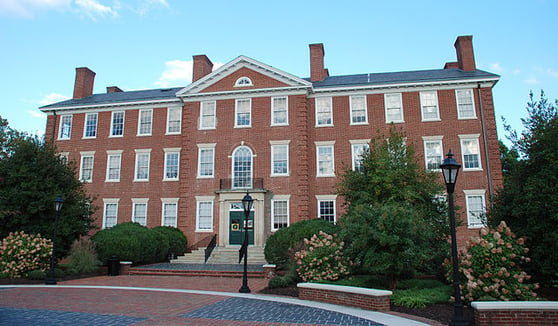
What is a need-aware college? Does a college being need aware mean they won’t accept students who need financial aid? What colleges are need aware?
There are a lot of misconceptions about need-aware colleges and how they handle applicants who need financial aid. Having the wrong information can lead students to skip applying to schools that could still very well accept them and offer generous aid packages. Read this guide to be fully informed on need-aware colleges.
What Is a Need Aware College?
Need aware colleges are those that take students’ ability to pay college tuition into consideration. This means that, hypothetically, if a school is trying to decide between two students, they may choose the one who requires less or no financial aid because that’s cheaper for them. Rising costs and reduced budgets have forced many colleges to take financial need into account. The opposite of need aware schools are need blind schools, which don’t take applicants’ financial needs into account at all during the application process.
Need-aware colleges sound kind of intimidating, don’t they? Many students and their families can’t afford college costs upfront, and now that can stop you from getting into schools? That’s technically true, but it actually isn’t as big a deal most of the time as it’s made out to be. In fact, there are many misconceptions about both need-aware and need-blind schools.
First, even if a school is need aware, your financial needs will never be the biggest consideration in determining if you’ll be accepted. Schools aren’t searching through applications to find only the richest students to save them money. If colleges did that, it would hugely damage the school’s reputation, and likely result in a huge drop in applications. Those consequences would cause much larger financial problems for the school than having to offer loans and other financial aid to students.
Colleges will always be more interested in your grades, your essays, your extracurriculars, your letters of rec, etc. than your financial situation. For domestic students, your financial need will really only be considered if you’re right on the cusp of being admitted or not, and even then it may not really come into play. The truth is that a school being need aware has little or no impact on the vast majority of students who apply. If you’re a great student, schools will want to have you, regardless of your financial need.
On the flip side, need-blind schools sometimes aren’t as great as many people initially think they are. Most importantly: just because a university is need blind doesn’t mean tuition is free. It actually may not have any positive impact on your financial aid package at all. The only thing need blind means is that your financial needs aren’t looked at during the application process. Need-blind schools won’t necessarily give you more financial aid or better financial aid. It’s actually perfectly possible for a need-aware school to offer you more scholarships than a need-blind school would.
Again: being need aware or need blind doesn’t have an impact on the financial aid you end up receiving. It’s only important during the application process, and even then it rarely makes a difference.
How Does Need Aware Differ for Domestic vs International Students?
Your financial situation can have a bigger impact on your application if you’re an international student. Many schools that are need blind for domestic students are need aware for international students, and it’s much more common for financial need to play a larger role in admissions decisions for international students than it is for domestic students. For example, Notre Dame is need-blind for domestic students, but need-aware for international students.
This is quite common. In fact, while there are over 100 colleges that are need blind for domestic students, there are only five colleges that are also fully need blind for international students, too: Harvard, Yale, Princeton, MIT, and Amherst. So need aware colleges for international students are more common.
An example of a school that is need blind for domestic students but need aware for international students is Brown University. In Brown’s case, in 2018, over 40% of their incoming class received financial aid, but only 15% of international students received financial aid. Additionally, only 6% of Brown’s financial aid resources were allocated to international students. Those are significant differences.
However, Brown is quick to note that, for international students, financial need is not a primary admissions factor and, in fact, it’s not considered at all when applications are first reviewed. Dean of Admission Logan Powell stated that, “The first principle of our admission process is that we always admit the strongest applicants regardless of need,” he said. “It’s only at the very end of the process, after we have selected the groups of (potential) students … that we have a better sense of what their financial need is.”
You can think of it as similar to public colleges offering lower tuition to in-state students than they do to out-of-state students. Colleges are primarily designed to educate students in their own state/country, and sometimes they receive federal money to help them with that. If students outside of those areas want to attend the school, they may need to pay their own way (or pay a larger part) to be able to attend a school not specifically meant for them.
This can be a tough break for international students hoping to attend an American university. If you’re looking for more affordable options, here’s an article going over the best universities for international students, including the colleges that offer the best financial aid packages to international applicants.

What Colleges Are Need Aware?
The vast majority of US colleges are need aware, at least to some degree. There are thousands of colleges in the US, and only slightly more than 100 are completely need blind. You can view the complete list of need blind colleges here.
Before we get into need-aware schools, let’s discuss need-blind schools, since they’re a much smaller group. Most need-blind colleges are private schools, although some large public schools, such as UNC-Chapel Hill, the University of Virginia, and the University of Illinois at Chicago are also need blind.
Need-blind schools are often those with large endowments, and schools with large endowments often have strong name recognition. Is NYU need blind? Yes, New York University is need blind, along with all eight Ivy League schools, and other top-tier schools like Stanford, Duke, and MIT. A number of small private schools are also need blind, including Bowdoin College, Swarthmore, and Olin College.
So what colleges are need aware? The vast majority of colleges are, particularly smaller public schools and lesser-known private schools. Some well-known need aware colleges are Tufts University, the University of Miami, Washington University in St. Louis, Ohio State University, and Texas A&M.
Because of the stigma associated with being need aware, schools don’t like to highlight it, and the information is often buried somewhere in the school’s website, if it’s mentioned at all. If a school doesn’t specifically state that it’s need blind, you can assume that it’s need aware, as colleges like to highlight when they’re need blind.
However, as we mentioned above, need-aware schools don’t make decisions based solely on financial need, it often isn’t a factor in admissions, and they can still offer excellent financial aid packages. For example, Tufts University meets full demonstrated financial need, even though it is need aware. Meeting full financial demonstrated need means that they’ll cover 100% of a student’s demonstrated financial needs with a financial aid package (usually a combination of grants, scholarships, and loans). This means students don’t need to take on outside loans.
Some need-blind schools don’t guarantee that they’ll meet full financial need, which means that, even if your financial need wasn’t a consideration during the admissions process, you’ll need to get outside loans, which often have higher interest rates and will result in you paying more for school in the end. That’s not a great place to be at. In fact, many schools, like Tufts, choose to be need aware because they want to be able to meet every student’s demonstrated financial need, but they need to look at applicants’ financial needs to make sure they can cover the costs.

Should You Apply to Need-Aware Colleges?
If there’s a school you’re interested in that’s need aware, you absolutely should still apply to it. Remember, for most people, a school being need aware won’t make any difference in the admissions process. It also doesn’t mean that the school won’t offer you a good financial aid package. Most students who attend need-aware colleges still receive financial aid, and need aware schools can sometimes offer more financial aid than need-blind colleges. It can be notoriously tricky to try to guess the type of financial aid package a certain school will offer you, so don’t make any assumptions on how much money you’ll get based on whether a school is need blind or need aware.
If you’re an international student, you may need to consider this question more. We still recommend that you apply to any school you’re interested in, even if they’re need aware. However, because financial need is often a stronger consideration for international applicants, some international students don’t apply for financial aid because they think it’ll hurt their chances of being admitted. It’s up to you whether or not you want to do this. Many families can’t afford college at all without financial aid, and that makes this option out of the question for them.
Our best advice for international students is to seriously think about both your financial state and your strength as an applicant. If you’re a particularly strong applicant, a school may admit you and offer you a good financial aid package, even if you’re an international student and they’re a need aware school. If you think you’re more of a long-shot applicant, and you can afford college without receiving financial aid, you could apply to the school without applying for financial aid. If you do this, we recommend applying to several other schools where you also apply for financial aid. Then, once admissions decisions and financial aid packages come in, you can make the best decision for yourself.
Summary: Need Aware College Admissions
Need-aware colleges are those that consider a student’s financial situation when making admission decisions. While you may think that need aware means students who need financial aid won’t get accepted, that’s not true at all. For domestic students, their financial need only matters a little bit, and it only matters in rare instances where students are on the cusp of being admitted or rejected. Even if you apply to all need-aware schools, your financial need likely won’t impact admissions decisions, especially if you have a strong application.
For international students, it is a bigger factor, but many need aware colleges still accept and offer aid to international students that need it. The vast majority of schools are need aware, and you shouldn’t decide not to apply to a school you like because it’s need aware. Need aware colleges can, and often do, offer stronger financial aid packages than need blind schools, so don’t assume you will or won’t get a certain amount of financial aid based on a school being need aware.

What’s Next?
Which schools are need blind? See our list of all 107 need blind colleges in the US.
Ready to start putting together a strategy for your financial aid applications? For an overview of the financial aid process, check out our simple guide to applying for financial aid.
Many financial aid packages offer students work study opportunities. Learn more about work study and how it can help you pay for your education.

Want to build the best possible college application?
We can help. PrepScholar Admissions is the world’s best admissions consulting service. We combine world-class admissions counselors with our data-driven, proprietary admissions strategies. We’ve overseen thousands of students get into their top choice schools, from state colleges to the Ivy League.
We know what kinds of students colleges want to admit. We want to get you admitted to your dream schools.
Learn more about PrepScholar Admissions to maximize your chance of getting in.

Source: blog.prepscholar.com